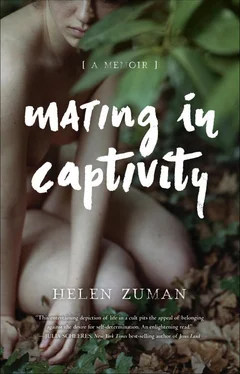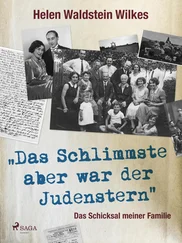In tandem, the man and woman pulled out their wallets and gave me twenty bucks each for a shirt.
Yes! My big break! I glowed for a moment—then resumed my slide toward another shameful total.
By 10:00 p.m., Cayta and Toba had both been popped. They got Mar to quit. I scolded myself for feeling relieved.
I knew before counting what my number would be.
I didn’t dare dissent when the others agreed to move on to DC.
Saturday morning, we set up in Georgetown. Saturday night, Cayta, flanked by Mar and Toba, drove me off the street. “You can’t sell like this. You’re a disgrace. Go sit in the van, hang in a coffee shop, whatever. Put your stuff away.”
Sunday morning, Cayta gave me a choice: sell or leave the Farm.
I couldn’t sell. I knew I’d fail. And I dreaded exile. So I asked what I’d asked years earlier, in Chicago: a day alone. A day at large. A day to chase a miracle to heal my traitor’s heart.
Cayta balked; home overrode her. But it didn’t matter. Miracles don’t appear on demand to deliver happy plot twists. They storm stories too weak to resist.
On Monday, September 27, 2004, I woke to slivers of sun on my comforter and the sound of Cayta’s voice. I slept next to a shuttered window in a bedroom whose floor I shared with four others. The window—our only one—opened onto the dining room, where Arol sipped tea in the mornings and often held court. As I rolled over so I could hear better, the dread I’d gone to bed with clutched me in a suffocating hug.
Cayta was charging me with being incorrigible.
“I’m just so mad at her. I can’t believe she’s still pulling the same bullshit after all these years.”
Arol thunked her mug down. “She can’t go on like this. Call a meeting. Today. Maybe there’s some therapy you can try. Either that or she has to leave. You guys decide.”
I pulled the comforter over my head. Feigning sleep, I stayed cocooned till my roommates had risen and stowed their bedrolls. Then I fled to the bathroom, where I stared in the mirror and swore I’d fight: “If they tell me to leave, I’ll beg, I’ll plead, I’ll say I’ll do any thing.” I might have stayed all morning, if not for the frequent knocks, the yanks on the knob. Yielding my cave, I longed for a shroud to shut out the eyes.
Yet I still believed those eyes could be kind. When the meeting—from which I was barred—convened shortly before noon in the living room, I settled on a warm patch of grass in sight of the sliding doors and wondered what fix my friends might devise. Surely some revelation would rise to my rescue from the pool of group mind.
The doors slid open. Inside I saw an empty chair, facing Cayta. Lips in a grim line, she waved me to take it. I tugged at my circle-Z amulet; the string bit my neck. Cayta pulled her braid over her shoulder. My seat creaked as I leaned toward her.
“We think you should go,” she said.
My head jerked back in shock. My resolve to stay snapped. A desert calm filled my chest.
“I think you’re right,” I said.
This was soul death. Yet I pulsed with life—which raised the question of how to survive in exile.
Packing to hitch to California, in search of a warmer winter, I recalled having left for Idaho with three hundred dollars’ worth of ammo and a vow to return. This time, I might stay gone—and I knew desertion would haunt me. My best hope of relief lay in bringing no trace of the cause I’d betrayed—not even my circle-Z or Book of Scriptures . Unmarked, I could pretend I’d never been a Zendik.
But how would I get cash, without ammo, once I hit the road?
I knew Zendik pledged nothing to those who left. Yet Adam—who’d lived at the Farm a mere eight months—had received a $54 bus ticket, plus another $21. Shouldn’t I get at least that much, after nearly five years?
For the first time, I felt Zendik owed me.
I found Cayta and asked for money.
“What do you need money for?”
To calm my fear , I thought. To insert the slimmest buffer between me and the Deathculture .
“Food?” I said.
She scowled. “I’ll ask Arol.”
Minutes later, she returned with $10—a slap, not a gift. A note inscribed, See how little you mean.
My one other request was a ride to the highway—ideally in the early afternoon, so I’d have plenty of time to find a kind driver who’d give me a place to sleep. With luck, I might even outrun the rain rolling in from the east.
Tough shit, I was told. Cayta would tack me on to her trip to get bread. We’d leave at five; I’d start hitching by twilight.
Around four, Arol descended from the master bedroom to her kitchen, hair gleaming silver against her purple robe. Seeking closure—plus a hint that she’d miss me? a sliver of hope?—I approached. My heart thumped, though I’d already plunged from her favor. Exile meant distance, not release.
“I just wanted to say goodbye to you,” I said.
“Oh?” She turned to face me. “They decided you should go?”
Her show of ignorance might have perplexed me—had I been less obsessed with gaining one last shred of wisdom, or blessing.
“Yeah,” I said.
She glanced at the sky, gray with rain clouds. “Oh well. Maybe you can develop your writing.”
A scrap of hope, wrapped in despair. We both believed I’d fail at whatever I tried—art, friendship, love—without her guidance.
Yet into my pocket I’d slipped two white sheets, folded in quarters. On these, beyond her gaze, I would start my own story.
I CLIMBED INTO THE CAB of Hunter’s semi in the parking lot of a Country Kitchen off Interstate 40 in western Tennessee. His tractor, a sleek black Kenworth, had red and gold lightning bolts shooting from the grille.
“ Mi casa es su casa ,” he said with a wink, shooing Venus, his black Lab puppy, off the front seat. She curled up behind a gearstick high as my hip.
I met Hunter on September 29, two days after I left Zendik. By then I’d filled one white sheet with tugs, in tiny script, at doom’s grip: Might exile free the “I” trapped in “we,” prove that my time at the Farm belonged to me? Perhaps my task now—since working harder hadn’t worked—was to let go and let life add to my list of Things I Was Out Here to Experience. So far I’d enjoyed a night alone in a room of my own with a door I could lock, and the kindness of a string of men driving trucks. Hunter was the fourth trucker to pick me up.
“You can throw your bag in the back if you want.” He jabbed a thumb at the thick midnight-blue curtain dividing our seats from the sleeper. The night before, I’d slept in a top bunk in a cab trimmed with Christmas lights. I wondered if Hunter had one bunk or two. I knew he was due in LA Friday morning. It was already Wednesday afternoon. Maybe he’d drive all night and the question of sleeping arrangements wouldn’t arise.
“That’s okay. I’d rather keep it with me.” I fastened my seat belt and stowed my pack at my feet.
Past Memphis, hurtling over the Mississippi, Hunter showed me photos of his two teenage daughters and his ring from the Virginia Military Institute. He’d served twelve years as a lieutenant in the naval reserve, he said, before buying the semi. His wife, back home in the Blue Ridge, was studying for a degree in pharmacy. He was giving me a ride, I decided, because he craved company and believed it his duty to help those in need. I grouped him with the born-again married man who’d driven me from Nebraska to Utah, my first time thumbing cross-country, and never once touched me.
I hoped Hunter wouldn’t ask what I was doing on the road. When I’d tried to explain that to trucker number one, my voice had gone squeaky with sobs I couldn’t stop. “I don’t understand,” he’d said. “It doesn’t add up. You’re crying like this over leaving your friends ?” He’d sworn I was fleeing a lover who beat me.
Читать дальше











